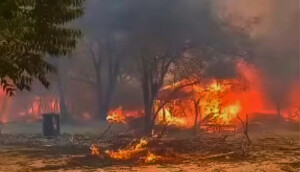El Burhan arrives in El Geneina following violent incidents in Darfur
A delegation led by Chairman of Sudan’s Sovereignty Council Lt Gen Abdelfattah El Burhan arrived in El Geneina yesterday morning to investigate the situation in West Darfur. The Darfur Bar Association (DBA) stressed the need for a military force in Darfur after the recent surge in violence.
 El Burhan arrives in West Darfur to investigate the situation in the state (SUNA)
El Burhan arrives in West Darfur to investigate the situation in the state (SUNA)
A delegation led by Chairman of Sudan’s Sovereignty Council Lt Gen Abdelfattah El Burhan arrived in El Geneina yesterday morning to investigate the situation in West Darfur. The Darfur Bar Association (DBA) stressed the need for a military force in Darfur after the recent surge in violence.
El Burhan was accompanied by Minister of Interior Affairs Lt Gen Ezzeldin El Sheikh and Director of the Intelligence Service Lt Gen Jamal Abdelmajeed. At the airport, they were received by the wali (governor) of the State and other local government officials.
The DBA explained in a press statement following their meeting with Sovereignty Council member Malik Agar in his office at the Republican Palace in Khartoum that there is an ‘urgent need’ for a high-capacity military force to protect people and maintain security in Darfur.
The Darfur lawyers also demanded that all groups should be disarmed, urgent measures should be introduced to stop human rights abuses and violations, and all perpetrators of violence should be brought to trial.
On Saturday, the Security and Defence Council decided to form a joint force from the regular forces that can intervene quickly to maintain security in Darfur. They also decided to activate disarmament procedures in El Geneina.
Darfur violence
In recent weeks, Darfur has witnessed various violent conflicts and incidents, most notably the recent violent conflicts in El Geneina. Some warned that this could be the consequence of the exit of the joint United Nations-African Union Mission in Darfur (UNAMID).
On Sunday, the West Darfur Doctors Committee announced that the total number of deaths resulting from last week’s violence is now at least 144, while at least 233 have been injured. In January, at least 163 people died in attacks on the city and adjacent camps for the displaced as Arab herdsmen targeted Masalit people*.
In South Darfur, the death toll from the massive fire that devastated multiple camps in Gireida rose to three. People from Gireida told Radio Dabanga that the burning continued for the second day in a row affecting thousands of houses.
According to witnesses, roughly two thousand people are still without a home and there is an urgent need for a speedy intervention by the state government, civil society organisations, and charitable people to take care of those without shelter.
In the town of Nyala, the displaced Suleiman Saleh (35) was killed in a new attack on Kalma camp on Sunday evening.
The General Coordination of Camps for the Displaced and Refugees said in a statement that this was the second attack within 24 hours. They said it was a direct attack against the displaced and held the transitional government responsible, demanding that the perpetrators be arrested and brought to trial.
On Saturday people, five youths were killed while they were watching football in the camp.
In North Darfur, activity resumed at the market in El Sareif Beni Hussein on Sunday afternoon after ten days of closure due to the recent violent events in which 15 people were killed and 15 others were wounded.
People from El Sareif Beni Hussein locality told Radio Dabanga that the authorities had detained 67 people in connection with the violence and transferred them to Shala Prison. They said that there was a relative improvement in the security situation but there were continuing tensions in some peripheral areas.
* Darfur has a long history of strife between Arab herding tribes and non-Arab African herders or sedentary farmers. Arab tribesmen were recruited by the previous regime of dictator Omar Al Bashir to join the Janjaweed militias. Al Bashir employed these militias, largely made up of Arab nomads, to repress a revolt over ethnic marginalisation in the region, mainly targeting non-Arab African farmers. According to the UN, the conflict left at least 300,000 people dead, and displaced more than 2.5 million. West Darfur is home to the Masalit, a non-Arab sedentary tribe. The governor and local government employees belong to this tribe.











 and then
and then